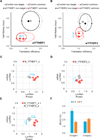N(6)-methyladenosine Modulates Messenger RNA Translation Efficiency
- PMID: 26046440
- PMCID: PMC4825696
- DOI: 10.1016/j.cell.2015.05.014
N(6)-methyladenosine Modulates Messenger RNA Translation Efficiency
Abstract
N(6)-methyladenosine (m(6)A) is the most abundant internal modification in mammalian mRNA. This modification is reversible and non-stoichiometric and adds another layer to the dynamic control of mRNA metabolism. The stability of m(6)A-modified mRNA is regulated by an m(6)A reader protein, human YTHDF2, which recognizes m(6)A and reduces the stability of target transcripts. Looking at additional functional roles for the modification, we find that another m(6)A reader protein, human YTHDF1, actively promotes protein synthesis by interacting with translation machinery. In a unified mechanism of m(6)A-based regulation in the cytoplasm, YTHDF2-mediated degradation controls the lifetime of target transcripts, whereas YTHDF1-mediated translation promotion increases translation efficiency, ensuring effective protein production from dynamic transcripts that are marked by m(6)A. Therefore, the m(6)A modification in mRNA endows gene expression with fast responses and controllable protein production through these mechanisms.
Copyright © 2015 Elsevier Inc. All rights reserved.
Figures







References
-
- Bokar JA. The biosynthesis and functional roles of methylated nucleosides in eukaryotic mRNA. In: Grosjean H, editor. Fine-Tuning of RNA Functions by Modification and Editing. Springer; 2005. pp. 141–177.
Publication types
MeSH terms
Substances
Associated data
- Actions
Grants and funding
LinkOut - more resources
Full Text Sources
Other Literature Sources
Molecular Biology Databases

